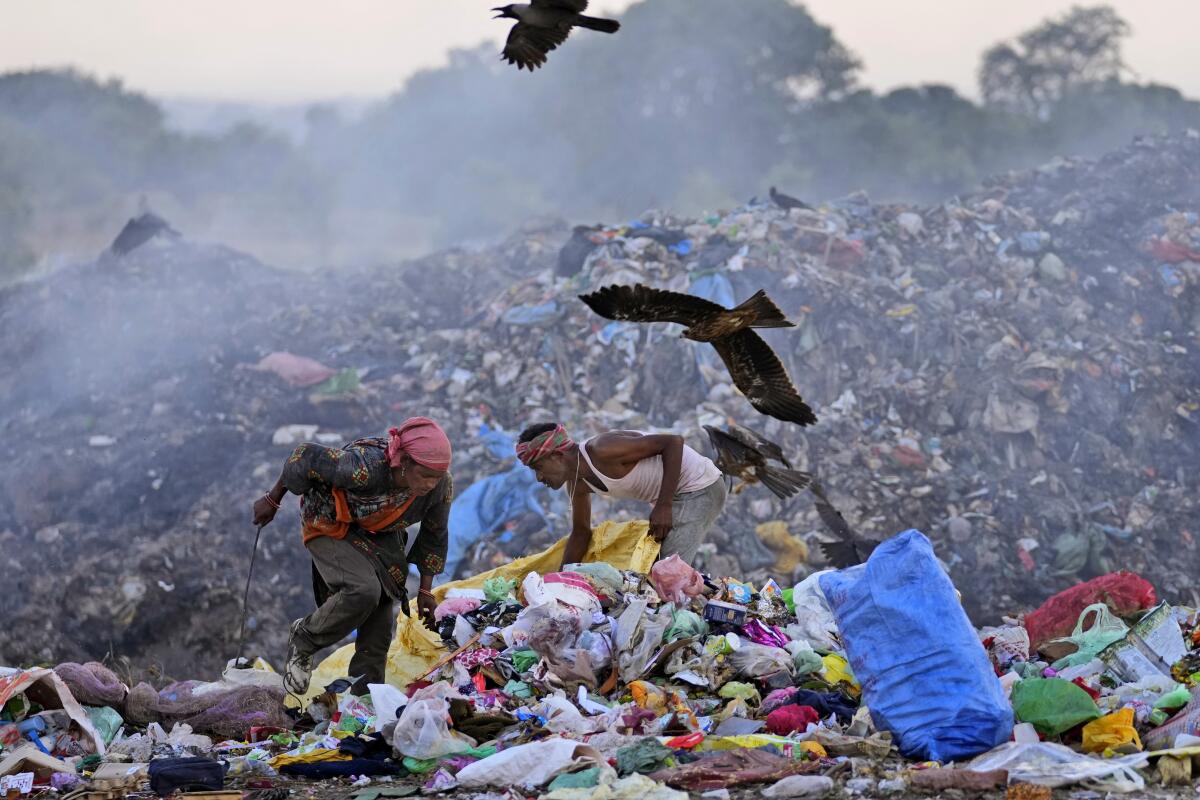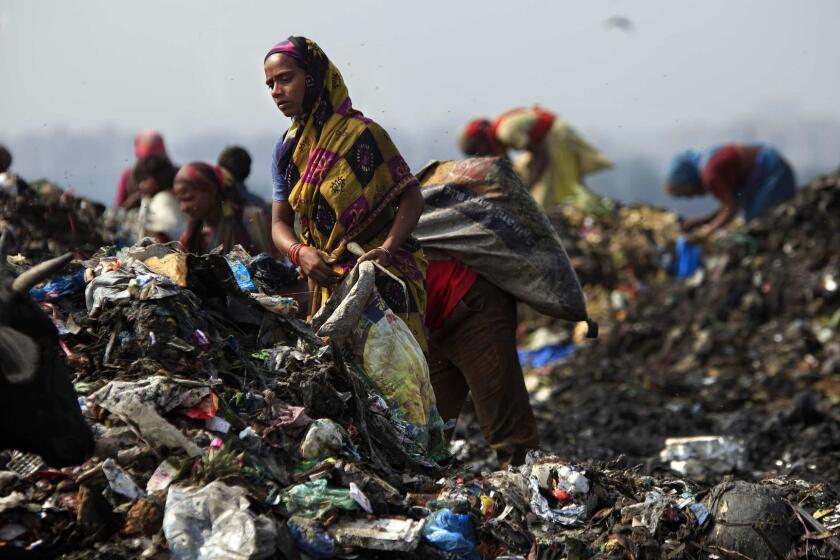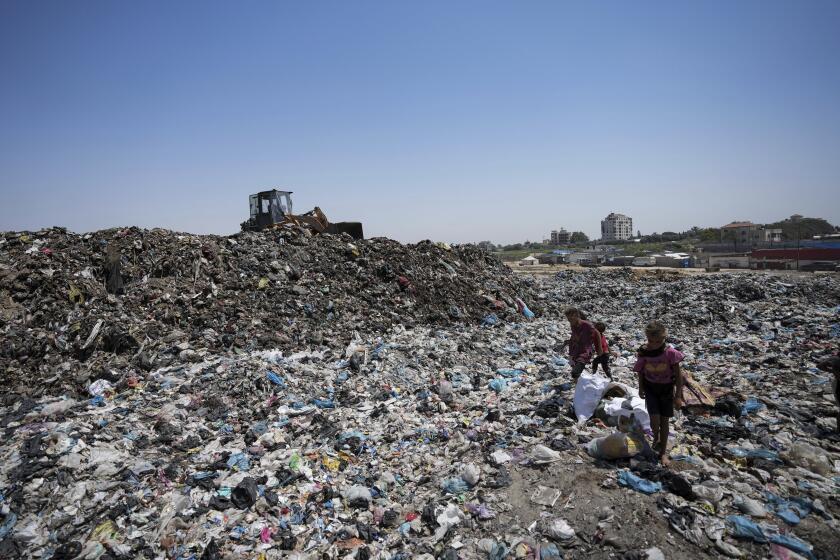For India’s garbage pickers, a miserable and dangerous job made worse by extreme heat

- Share via
JAMMU, India — The putrid smell of burning garbage wafts for miles from the landfill on the outskirts of Jammu in a potentially toxic miasma fed by the plastics, industrial, medical and other waste generated by a city of some 740,000 people. But a handful of waste pickers ignore both the fumes and suffocating heat to sort through the rubbish, seeking anything they can sell to earn at best the equivalent of $4 a day.
“If we don’t do this, we don’t get any food to eat,” said 65-year-old Usmaan Shekh. “We try to take a break for a few minutes when it gets too hot, but mostly we just continue till we can’t.”
Shekh and his family are among the estimated 1.5 million to 4 million people who scratch out a living searching through India’s waste — and climate change is making a hazardous job more dangerous than ever. In Jammu, a northern Indian city in the Himalayan foothills, temperatures this summer have regularly topped about 110 Fahrenheit.
At least one person who died in northern India’s recent heat wave was identified as a garbage picker.
For many in India, landfill is a livelihood and a home
The landfills themselves seethe internally as garbage decomposes, and the rising heat of summer speeds and intensifies the process. That increases emissions of gases such as methane and carbon dioxide that are dangerous to breathe. And almost all landfill fires come in summer, experts say, and can burn for days.
At the Jammu landfill, small fires dotted the massive pile, sending up plumes of smoke as two men hauled a frayed tarp loaded with garbage on the day Associated Press journalists visited. A 6-year-old boy clutched an armful of plastic sandals. As other pickers occasionally sheltered from the heat, birds wheeled overhead, occasionally touched down in their own search for scraps.
India generates at least 62 million tons of waste annually, according to federal government records, and some of its landfills are literal mountains of garbage, like the Ghaziabad landfill outside New Delhi. And while a 2016 law made it mandatory to segregate waste so that hazardous material doesn’t make its way to landfills, the law has been poorly enforced, adding to the risk of waste pickers.
“Since they mostly just use their hands, they are already contaminated by touching everything from diapers to diabetes syringes,” said Bharati Chaturvedi, founder of the New Delhi-based Chintan Environmental Research and Action Group.
It’s 6:30 a.m. in the Indian city of Mysuru and the streets are full of the sound of whistles blowing as workers in olive green aprons and rubber gloves begin a door-to-door search.
Chaturvedi, who has worked with waste pickers for more than two decades, said extreme heat has added new risks to waste pickers who are already victims of social discrimination and appalling work conditions.
“It’s been a terrible, terrible, terrible year,” she said. “They already expect to suffer from the heat and that gives them a lot of anxiety, because they don’t know if they’ll make it, if they’ll survive” the summer.”
Chaturvedi said this year’s heat has “been the most catastrophic thing one could imagine” adding, “It’s really very sad to look at how the poor are trying to live somehow, just take their bodies and try to reach the end of this heat wave in some form of being intact.”
Heatstroke, cardiovascular diseases and chronic kidney diseases are some of the risks from working outdoors during high heat.
Waste pickers “are among the most vulnerable and highly exposed to heat,” said Abhiyant Tiwari, who leads the climate resilience team at the Natural Resources Defense Council’s India program.
For many in India, landfill is a livelihood and a home
In New Delhi, some people who work the capital city’s estimated 4.2 million annual tons of garbage have cut back from two meals a day to just one, said Ruksana Begum, a 41-year-old waste picker at the Bhalswa landfill in the city.
“They are trying to avoid work because of the heat since if they go to work they end up spending more at the hospital than for their food,” Begum said.
Tiwari and Chaturvedi both said it’s essential to give waste pickers access to a regular water supply, shade, or a relatively cool building near the landfills. They should also be encouraged to avoid working at high heat and given prompt medical care when they need it, they said.
Tiwari said India has taken significant steps to devise heat action plans, but implementing the plans all across the country is a challenge.
Children trudge through water contaminated with sewage and scale growing mounds of garbage in Gaza’s tent camps for displaced families.
“As a society, we have a responsibility to protect them [garbage pickers],” said Tiwari. Simple steps can help, such as offering them water if they’re standing outside people’s homes, rather than asking them to leave, he said.
Geeta Devi, a 55-year-old garbage picker also at the Bhalswa landfill in New Delhi, says when she feels dizzy in the heat she takes shelter, and sometimes someone gives her water or food. But she has to work to earn the 150-200 rupees ($1.80 to $2.40) per day that puts food on the table for her children.
“It is difficult to do my job because of the heat. But I have no other job,” she said.
Anand, Nagpal and Arasu write for the Associated Press. Arasu reported from Bengaluru and Nagpal reported from New Delhi.
More to Read
Sign up for Essential California
The most important California stories and recommendations in your inbox every morning.
You may occasionally receive promotional content from the Los Angeles Times.












